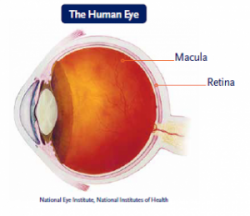As part of Diabetic Retina Screen (The National Diabetic Retinopathy Screening programme), in partnership with NEC Care, our Diabetes Care Centre is a venue where members of the local diabetes community will attend for their eye screen. This is by invited appointment from the programme.
For more information, contact 1800 454555, email [email protected] or visit www.diabeticretinascreen.ie
Below is an excellent video and Review by Sean Kirwan, Medical Scientist, and Research Associate at UCD and ICON plc
Diabetic Retinopathy from Sean Kirwan on Vimeo. This 3D animated video was created by Sean Kirwan, Medical Scientist, during a Knowledge Exchange Dissemination Scheme (KEDS) with University College Dublin and ICON Firecrest, funded by the Health Research Board. Lead Pharmacologist was Sean Kirwan and 3D Graphic Designers included Carlos Tena and Tomás O’Sullivan of ICON Firecrest. Support Pharmacologist was Dr Paul Halley of ICON Firecrest. Dr Breandán Kennedy (UCD) and Dr Rosemarie Carew (ICON Firecrest) were project supervisors.
Review of Diabetes & Diabetic Retinopathy
Understanding diabetic retinopathy
 As you know diabetes is a condition where the body can’t use and store sugar properly and this can cause many health problems. Too much sugar in the blood can cause damage to blood vessels throughout the body, including the blood vessels in the eye. These eye changes are called diabetic retinopathy.
As you know diabetes is a condition where the body can’t use and store sugar properly and this can cause many health problems. Too much sugar in the blood can cause damage to blood vessels throughout the body, including the blood vessels in the eye. These eye changes are called diabetic retinopathy.
If you have diabetes, it is vital to have the back of your eyes effectively screened every year.
What is diabetic retinopathy?
To understand diabetic retinopathy it helps to know a little bit about how your eye works. The lining at the back of your eye is called the retina. The job of the retina is to help change what you see into messages that travel along the sight nerve to the brain.
In the centre of the retina is an area called the macula which is really important for clear, sharp vision.
Diabetic retinopathy is the name used for different types of changes in the retina which can affect your sight, these include:
• Diabetic Macular Edema (DME) – this is where leaky blood vessels affect the important central part of the retina called the macula (the part of the eye responsible for detailed central vision). Diabetic macular edema is the more common type of eye change
• Proliferative Diabetic Retinopathy – this is where fragile new blood vessels form gradually on the surface of the retina over time.
What causes diabetic retinopathy?
When someone has diabetes, over time the blood vessels in the retina become thicker and the blood flowing in the blood vessels slows down. The retina tries to help speed up the blood flow by producing tiny amounts of chemicals to open up the blood vessels.
These chemicals have two side effects:
• they can make the blood vessels leaky (diabetic macular edema);
or
• they can cause the retina to make new blood vessels which are very fragile (proliferative diabetic retinopathy).
Both diabetic macular edema and proliferative diabetic retinopathy can be treated and managed if they are detected early enough. If they are left untreated, sight problems will develop.
Could I develop diabetic retinopathy?
Anyone with diabetes can develop diabetic retinopathy. The longer you have diabetes, the more likely you are to develop the condition. Poor blood sugar control in diabetes can make diabetic retinopathy worse and can increase the risk of developing sight problems.
What are the risk factors for diabetic retinopathy?
• Poor blood glucose control
• High blood pressure
• Raised fats (triglycerides) in the blood
• Pregnancy (not gestational diabetes). During pregnancy, diabetes can worsen diabetic retinopathy.
How will I know if I am developing diabetic retinopathy?
You may not notice anything as there may be no symptoms in the early stages of diabetic retinopathy. But talk with your diabetes care team if you:
- experience blurred vision or any changes in your sight,
- see new black spots,
- floaters’ that appear to float in your eye,
- have trouble seeing things at the side of your vision.
Blurred vision can happen at any stage of diabetic retinopathy, although it is more likely to occur the longer you have diabetes. Blurred vision happens for two reasons:
- with diabetic macular edema, leaky blood vessels cause swelling of the macula, which can lead to blurred vision.
- with proliferative diabetic retinopathy, fragile new blood vessels on the retina cause bleeding in the eye.
This can also lead to blurred vision. Don’t wait for symptoms to appear. It is important to attend your diabetes and eye screening appointments. Early detection and treatment can help to avoid sight loss from diabetic retinopathy.
How is diabetic retinopathy detected?
Regular eye screening is the best way to detect diabetic retinopathy before you notice any changes in your sight. The Diabetic Retinopathy Screening service uses specialised digital photography to look for changes that could affect your sight. This is painless and safe.
When the condition is caught early, treatment is effective at reducing or preventing damage to your sight. Diabetic retinopathy eye screening is a key part of your diabetes care. The National Diabetic Retinal Screening Programme, ‘Diabetic RetinaScreen’ www.diabeticretinascreen.ie offers free, regular diabetic retinopathy screening to all people with diabetes, aged 12 and older.
How can I check I am on the diabetic retinopathy screening programme register?
If you have either Type 1 or Type 2 diabetes please Freephone 1800 45 45 55 to check if you are on the Diabetic RetinaScreen register. If you are not your GP (family doctor) can register you by ringing 1800 45 45 55.
Once I am registered with the diabetic retinopathy screening programme how do I get my eye screening appointment?
Once you are on the register, you will be invited by letter to participate in Diabetic retinopathy screening programme. When you get the letter if you would like to participate in the screening programme, you must call Freephone 1800 45 45 55 to consent to give the programme permission to receive, hold and share your personal details within the programme. You will then be sent an appointment letter to attend for free diabetic retinopathy screening at a local screening centre.
For more information, contact the freephone number 1800 454555 or visit www.diabeticretinascreen.ie
Is diabetic retinopathy eye screening the same as a regular eye test?
No. A regular eye test for glasses or to check for glaucoma or cataract is not the same as a full diabetic retinopathy eye examination. It is important to have both.
Is there a charge for diabetic retinopathy eye screening?
There is no cost to you for this service if you hold either a medical card or a Long Term Illness book
How can I avoid getting diabetic retinopathy?
You can help prevent or slow the development of diabetic retinopathy by:
- taking your prescribed medication;
- sticking to your recommended diet as best you can;
- exercising regularly and sensibly;
- controlling high blood pressure;
- limiting your alcohol intake;
- avoiding smoking;
- attending your regular diabetes check-ups; and
- attending your diabetic retinascreen appointments when invited.
How is diabetic retinopathy treated?
If you get diabetic retinopathy, a good diet, regular exercise and looking after your blood sugar can slow down the development of the condition. Treatment depends on the amount and type of changes in your eyes and is aimed at slowing or stopping those changes.
Diabetic macular edema can be treated with a laser or injections of medicine in the eye or a combination of both treatments. Proliferative diabetic retinopathy is typically treated with a laser but some people may need injections and surgery inside the eye. You and your diabetes care team will decide together which treatment is best for you.
What should I do if I have a problem with my sight?
Talk to your diabetes care team as soon as possible. Treatments are available to help you to maintain your vision.
This page is supported by Novartis


